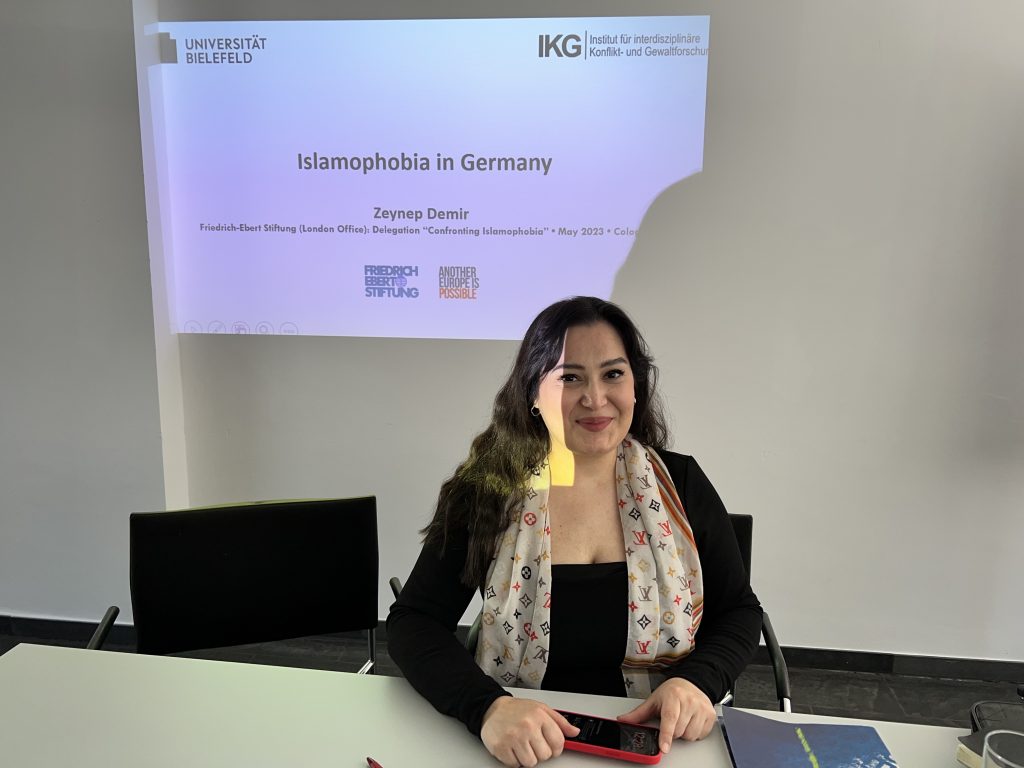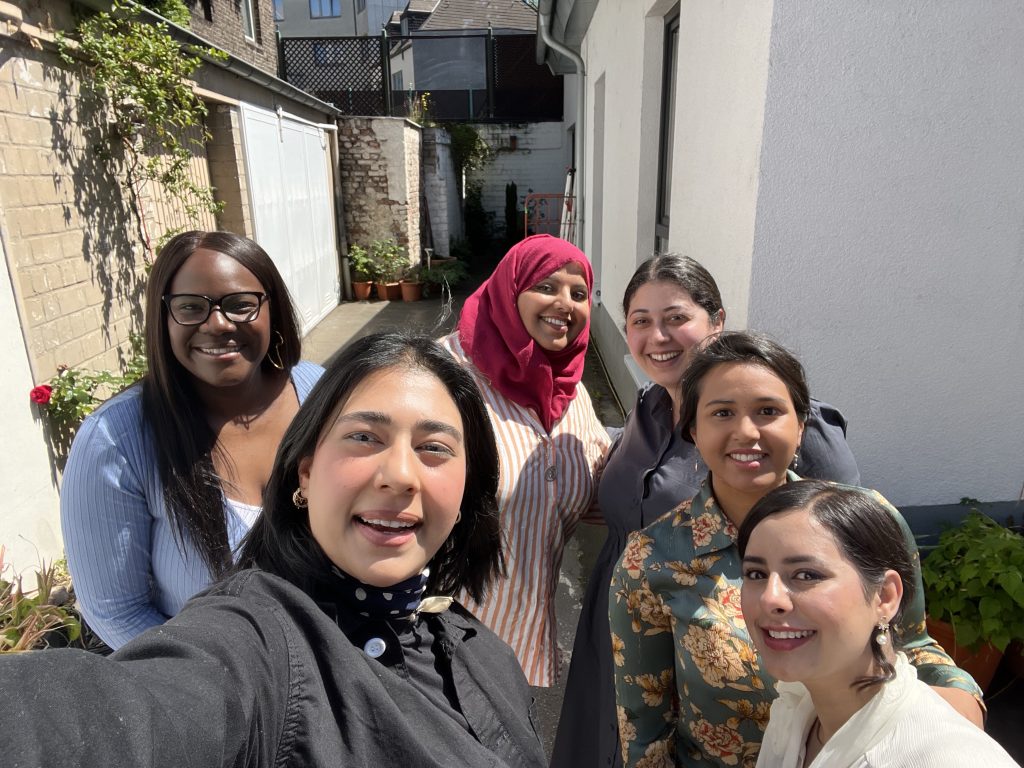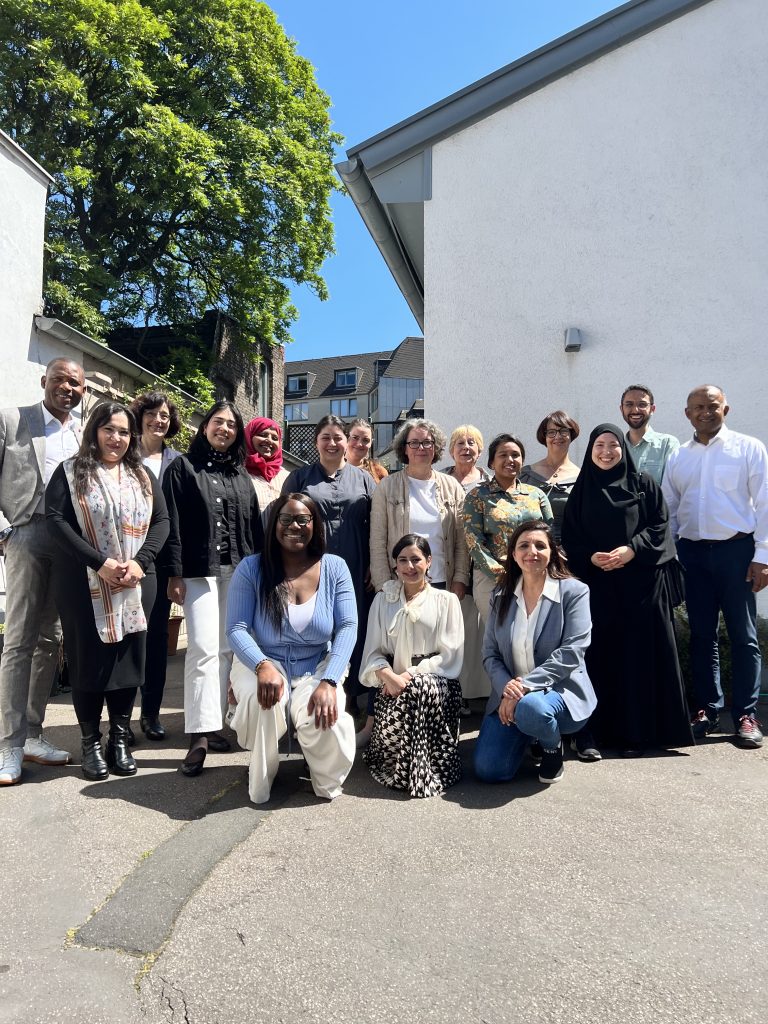Seema Syeda presents a case study of a Muslim women-led transnational initiative to address Islamophobia.
Islamophobia is widespread in Europe in all spaces across the political spectrum. In the UK Muslims and those perceived to be Muslim were the number one target of religiously motivated hate crime in the year ending March 2023. Latest research in Germany shows that almost 1 in 3 Muslims (30%) in Germany state that they have been physically assaulted several times in the past year, with 50% being physically assaulted at least once. 1
“1 in 3 Muslims (30%) in Germany state that they have been physically assaulted several times in the past year.”
There is a long historic context to anti-Muslim hatred in Europe. From the medieval crusades and religious persecution of the Spanish Inquisition, Europe’s more recent history of colonisation (including multiple genocides of Muslim and other populations), to the Bosnia genocide and persecution of Crimean Tartars, the continent has been the site of serious violence directed towards Muslims. This violence is little acknowledged in traditional and institutional histories and narratives of Europe. Today the construction of a white Judeo-Christian identity that dominates mainstream Western discourse about who can and who cannot be ‘European’, often directly but also insidiously, for instance in discourse around ‘integration’ and migration, contributes to an exclusive, violent and discriminatory space for Muslims and other racialised communities.
Economic Context
In many European societies, Muslims are amongst the lowest income bracket and are overwhelmingly working class. In modern capitalist society, which continues to be structured by an imperialist world order, Muslim populations around the globe are often amongst the most exploited for land and resources. From Bangladesh, where British colonialism and resource exploitation provided the motor for Europe’s Industrial Revolution, enriching the continent while impoverishing South Asia, to Iraq, Palestine, Libya and countless other countries invaded and bombed by European powers and their allies for access to land and oil, this imperial world structure has also shaped migration flows to Europe where migrants from majority-Muslim countries and other racialised groups can be exploited for cheap labour.
It is thus useful for the ruling classes of Europe to maintain violent borders and harsh rhetoric and policies against resident Muslim populations and Muslim and racialised migrants. This aids in the continuous economic exploitation of these populations, many of whom live in economic insecurity, and also provides an easy scapegoat for the failings of nation-states and the EU to create equitable living conditions for all members of the population.
The political, social and economic context above have established a broader structure of White Supremacy in Europe and the world. Scholar Francis Lee Ansley defines it as follows:
By “white supremacy” I do not mean to allude only to the self-conscious racism of white supremacist hate groups. I refer instead to a political, economic, and cultural system in which whites overwhelmingly control power and material resources, conscious and unconscious ideas of white superiority and entitlement are widespread, and relations of white dominance and non-white subordination are daily re-enacted across a broad array of institutions and social settings (Ansley, 1997).
The campaign
Another Europe Is Possible (AEIP) was founded to campaign against Brexit from a progressive and left-wing perspective. This meant supporting the transnational nature of the EU whilst being critical of its crony capitalist, neoliberal and imperial tendencies, including violent border regimes. It also meant tackling the structural causes of Brexit, particularly anti-immigrant sentiment and scapegoating of migrants for the inequality and economic failures caused by the state.
Noting the rampant Islamophobia amongst the supporters and the rhetoric of the ‘Leave’ campaign and the far right in the UK and Europe, AEIP decided to launch a transnational anti-Islamophobia campaign, focusing on the UK, France and Germany as key sites of state-led and far right Islamophobia.
Process and actions
AEIP is a member-led democratic organisation. It’s strategy is decided by the National Committee, elected by members. A proposal to launch an anti-Islamophobia campaign was put forwards at National Committee and agreed.
An anti-Islamophobia working group was established. It was led by members of the National Committee with lived experience of Islamophobia – Seema Syeda and Shaista Aziz, who both have Muslim backgrounds.
An important foundation of any successful anti-racism campaign is that it should be led by those with lived experience; firstly to counter the dominance of white supremacy rather than reinforce it, but also because those with lived experience are by nature best placed to understand the nuances of the issues at play. It was also important as recognition of the fact that Islamophobia could be present and reinforced within our own organisation and progressive spaces alike, as it is a societal problem which few people have had awareness training and exposure about. Those without lived experience were also involved in the working group as key allies and supporters.
“An important foundation of any successful anti-racism campaign is that it should be led by those with lived experience.”
One of the first steps requested by the National Committee was an anti-Islamophobia training session for the committee itself. AEIP lacked financial resources for a formal training at the time, but we did run a public anti-Islamophobia event platforming UK Muslim voices who described the different kinds of Islamophobia they had experienced in progressive, centrist, right-wing and far right spaces alike, as well as the connection between Brexit and Islamophobia.
We then held a transnational event in the run up to the French presidential election 2022 where Marine Le Pen ran her candidacy on a deeply Islamophobic campaign while the incumbent President Macron replicated some of her language and implemented Islamophobic policies, continuing a long tradition of French state attacks on the basic rights of Muslims in the metropole and in the colonies, supported by actors across the political spectrum. At this event we platformed self organised Muslim and migrant-led groups such as the Front Uni Des Immigration et Quartiers Populaire aswell as important allies such as Centre d’études et d’initiatives de solidarité internationale (CEDETIM) and Réseau Initiatives pour un autre monde (IPAM).
Funding
To move the campaign beyond online events, funding was needed. Allies and supporters on the national committee with strong links to funders supported the campaign by finding a funder, the Friedrich Ebert Stiftung, to enable us to conduct research into Islamophobia across Europe.
Research
The research project was led by a staffer (myself) from a Muslim background with lived experience of Islamophobia. Two research reports were produced, one analysing Islamophobia in France and another analysing Islamophobia and the rise of the far-right in Germany. The reports were launched at a fringe event of Labour Party Conference 2022 as well as online.
The success of this collaboration led to further funding to build practically on the report’s recommendations.
Transnational organising
Funding was secured from the FES and AEIP for a delegation of all-women Muslim elected representatives and civil society activists to visit Cologne, Germany and meet with various civil society and faith representatives, researchers, NGOs and elected officials, Muslim and non-Muslim alike, to share knowledge, experience and campaigning goals across borders. Organisational, administrative and network contacts in Germany were provided by FES London. A particular focus was tackling Islamophobia within political parties such as the Labour Party and the SPD, as well as progressive spaces in general. The delegation took place in May 2023 and resulted in the publication of a report with recommendations. The report was launched to a U.K. audience in November 2023 coinciding with UK anti-Islamophobia Awareness Month, and will be launched to a German audience in 2024.
Key Outcomes
Outcome 1:
Creating a space for awareness raising about Islamophobia within left and progressive organisations.
The opening of such a space, led by women activists from Muslim backgrounds, was an achievement in itself. Islamophobia specifically is rarely given attention or discussed within progressive spaces. The 2022 fringe event at Labour Party conference, for instance, was the only one of its kind to explore the issue.
One of the findings of the 2023 delegation was that racism and Islamophobia were inadequately tackled within progressive organisations and spaces, partly due to a belief amongst the leadership and membership of those organisations that they didn’t have internal anti-racism or Islamophobia issues because they ‘instinctively’ had the right politics. The lack of representation beyond token diversity in these spaces indicates that they too replicate the structural problems of racism and discrimination.
With political parties like the Labour Party and the SPD specifically, this is further evident in policies that reinforce violence towards migrants, racialised people and Muslims at home and abroad.
The UK space does have some examples of Muslim groups starting to self-organise, as well as ‘Black Asian and Minority Ethnic’ spaces within the Labour Party. While this is a slightly better landscape than the German context where fewer such spaces/initiatives exist, the delegation was able to discuss some of the opportunities and inadequacies of the ‘BAME’ approach, as outlined in the report.
The opening up of spaces to discuss these issues was a key change in itself, with German representatives expressing surprise that it was even possible to organise such a delegation. It was the first time many activists had the opportunity to attend a transnational anti-Islamophobia discussion. Groups such as Another Europe Is Possible itself, the Friedrich Ebert Stiftung and the SPD have begun to change internally by simply creating such spaces, though there is much more work to be done.
Outcome 2:
Empowerment of Muslim ‘leaders’
AEIP staffers leading the project augmented their transnational organising and project management skills in a European, party political and civil society context. Delegates on the project also went on to greater leadership positions, one young delegate is now standing in local elections in order to increase Muslim women’s representation and another has since founded the ‘Anti-Islamophobia Working Group’ which lobbies institutions and civil society to tackle Islamophobia. Other leading researchers have expanded the reach of their research to activist and civil society groups outside their home countries.
Outcome 3:
Networks and partnerships
A key transnational network of anti-Islamophobia campaigners acting across left and progressive political spaces has been created. This network shares information and knowledge, providing a base to continue its joint campaigning initiatives in the years ahead. The struggle to tackle Islamophobia is a long-term one that requires many years of commitment. Further funding has been secured to continue the campaign in 2024.
Key lessons learned
- Centre people with lived experience as leaders and organisers
- Advocate community self-organising
- Engage allies and supporters in broader campaigning, networking and knowledge-sharing spaces
- Use partnerships and collaborative working to join up local and national grassroots actors across borders, focusing on specific themes relevant to all, e.g. Islamophobia
- Physical meetings are an important complement to online events, in order to build trust
- With anti-racist work, it is important to acknowledge white supremacist and colonial structures can and do exist within progressive spaces. This awareness itself is an important starting point for any constructive and meaningful work to begin dismantling these structures.
On anti-Islamophobia specifically, it must be acknowledged that there is no clear ‘win’. Indeed, Islamophobia continues to be on the rise across the UK, Germany and France, with a tendency amongs political parties such as Labour and the SPD to take ever worsening stances on the issue in response to (and reinforcing) the rising popularity of the far right. Reformist approaches grafted onto an underlying structure of coloniality can only go so far – anti-racist campaigning requires clear anti-colonial analysis and action.
“Anti-racist campaigning requires clear anti-colonial analysis and action.”
Seema Syeda is Head of Communications at European Alternatives. She has a varied background in publishing, law and organizing with a key focus on dismantling racial capitalism. Seema has recently started a substack @seemasyeda. She writes this article in her capacity as a campaigner at Another Europe Is Possibe.
This case study was written for European Alternative’s Movement Learning Catalyst project.



© Seema Syeda
1 Zick, Andreas, et al. (2023): Muslimische Erfahrungen Und Wahrnehmung Der Muslim- Und Islamfeindlichkeit in Der Gesellschaft. Eine Mixed-Methods-Studie Für Den Unabhängigen Expertenkreis Muslimfeindlichkeit.